新概念英语第二册语法总结:一般将来时
新概念英语第二册重要句型和语法汇总

Lesson 1简单陈述句的语序1)句子种类:按句子结构分为简单句、并列句、复合句2)句子成分:主语、谓语、宾语、定语、状语、补语、表语3)简单句的基本成分和语序:参考教材第14页的表格和练习一、重要句型或语法Lesson 21、时态复习1)一般现在时,如:I never get up early on Sundays.2)现在进行时,如:I'm still having breakfast.2、感叹句1)由what引导的感叹句,强调名词,如:What a hot day!2)由how引导的感叹句,强调形容词或副词,如:How hot it is today! / How fast he runs!Lesson 31、时态复习一般过去时,表示过去发生的事情,如:The driver of that car hit that post over there.2、双宾动词1)双宾动词是指某些动词后面可以跟两个宾语,表物的为直接宾语,表人的为间接宾语。
2)注意区分双宾动词后间接宾语前用to还是for的区别,一般表示动作对某人而做用to,表示动作为某人而做用for。
如:He passed the salt to me. / She bought the tie for me.Lesson 4时态复习现在完成时,表示过去发生的事情对现在造成的影响或结果,如:I have seen the film.该句可能暗含的潜台词是:我对这部电影的情节比较了解了或者我不愿意再看这部电影了。
1)标志性词语:already/just/yet/never/ever2)常见时间状语:recently/lately;in the past/latest+一段时间;up to now/so far3)have been to(去过已回)与have gone to(去了未回)的区别4)瞬间动词(可用于完成时,但不能与一段时间连用)与持续动词的区别5)since(+具体时间/时间点)与for(+一段时间/时间段)的区别Lesson 51、时态复习1)一般过去时,表示过去发生的动作或状态,如:Yesterday, a pigeon carried the first message from Pinhurst to Silbury. / He was very tired after a whole day's work last night.2)现在完成时,表示过去发生的动作对现在造成的影响或结果,如:He has just bought another garage in Pinhurst. / In this way, he has begun his own private'telephone' service.2、有关way的短语1)in the way,表示挡路了或是按照某种方法/方式,如:The chair is in the way. / Do the job in the way your teacher has shown you.2)on the way,表示在路上,如:On the way home, I bought some cakes for my daughter.3)in this way,表示用这种方法,如:In this way, he has saved more than five thousand dollars.4)by the way,表示顺便说一下,如:By the way, have you seen Tom recently?5)in a way,表示在某种意义上,如:In a way, he is more than a teacher to us.Lesson 61、冠词的用法1)不定冠词a/an,如:a pen, an egg2)定冠词the,如:A dog is barking at me. The dog is black and white.3)零冠词,即不用冠词的情况,如人名和地名前面,如:John lives in London.2、短语动词的用法短语动词指的是后面跟上介词或副词后、意思会发生变化的动词。
新概念第二册每课的语法重点整理

新概念第二册每课的语法重点整理第1课- 介词的用法:in, on, at 等表示时间、地点和方式的介词的用法和区别。
第2课- 被动语态: 被动语态的构成和用法,如何将主动句改写为被动句。
第3课- 不定代词:some, any, no, every等不定代词的用法和区别。
第4课- 动词的时态:一般现在时,一般过去时以及一般将来时的构成和用法。
第5课- 非谓语动词:动词不定式、动名词和分词的形式和用法。
第6课- 数量的表达:基数词和序数词,还有一些常见的数量词的用法。
第7课- 情态动词:can, could, may, might等情态动词的用法。
第8课- 连词的使用:and, but, or, so等连接词的用法和区别。
第9课- 名词的所有格:名词所有格的构成和用法,以及经典的名词所有格的错误用法。
第10课- 现在完成时:现在完成时的构成和用法,与一般过去时的区别。
第11课- 介词短语:介词短语作状语的用法和常见表达方式。
第12课- 虚拟语气:if条件句和虚拟语气的构成和用法。
第13课- 比较级和最高级:形容词和副词的比较级和最高级的构成和用法。
第14课- 状语从句:时间、地点、原因、条件等状语从句的引导词和用法。
第15课- 间接引语:直接引语和间接引语的转换和用法。
第16课- 冠词的使用:冠词a, an和the的用法和区别。
第17课- 时态的混合使用:不同时态的混合使用,如何表达不同的时间关系。
第18课- 直接引语:如何准确地引述他人的原文,注意引号和标点的使用。
第19课- 句型的使用:如何正确地使用倒装句、感叹句和祈使句。
第20课- 能愿动词:能愿动词的构成和用法,如何表达能力和意愿。
第21课- 主谓一致:主谓一致的原则和方法。
第22课- 介词的构成:介词形式的构成和用法,以及常见的介词短语。
第23课- 代词的使用:人称代词、物主代词和不定代词的用法和区别。
第24课- 婉转的表达:如何用委婉的方式表达意见、请求和建议。
新概念二:一般将来时_将来进行时_将来完成时练习
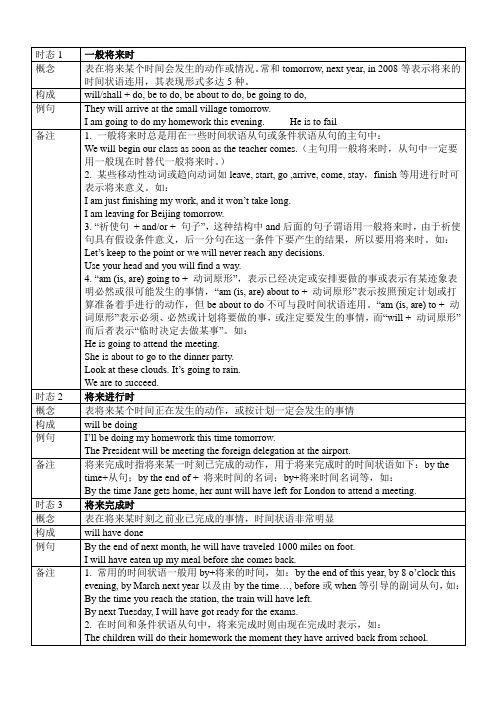
练习:一.单选题1. There __________ a meeting tomorrow afternoon.A. will be going toB. will going to beC. is going to beD. will go to be2. Charlie ________ here next month.A. isn’t workingB. doesn’t workingC. isn’t going to workingD. won’t work3. He ________ very busy this week, he ________ free next week.A. will be; isB. is; is /C. will be; will beD. is; will be4. There ________ a dolphin show in the zoo tomorrow evening.A. wasB. is going to haveC. will haveD. is going to be5. If it ________ tomorrow, we roller-skating.A. isn’t rain ,will goB. won’t rain , will goC. doesn’t rain,will goD. doesn’t fine ,go6.I won’t be able to attend the meeting tonight because____ then.A. I must have a classB. I will be teaching a classC. I teach a classD. I will have taught a class7. -----Could you give these books to Mr. Black?-----Absolutely, ___ him at five this afternoon.A. I will have a talk withB. I have a talk withC. I can have a talk withD. I will be having a talk with8. I’m afraid I won’t be available then. I ___ a friend at three this afternoon.A. seeB. am seeingC. will seeD. will be seeing9. Next Friday I to another concert. They ____ some thing by Mozart at that time.A.go, playB.will go , will be playingC. will go , are going to playD. are going ,are to play10. -----What are you doing, Jack?-----Make a model plane. I ____ it in the science class at 10 o’clock tomorrow morning.A. will be showingB. am going to showC. showD. have showed11. By the end of this year ,I ____enough money for a holiday.A will saveB will be savingC will have savedD have saved12. I have been studying here for four years,by next summer ____-.A shall graduateB shall be graduatedC shall be graduatingD shall have graduated13. I hope her health _______greatly by the time we come back next year.A improvesB improvedC will be improvedD will have improve14. “Are you going to Richard”s birthday party?…“Yes.By then I ______my homework..”A had finishedB will have finishedC would have finishedD finished15. I suppose by the time I come back in ten years‟ time all these old house______down.A will have been pulledB will be pullingC will have pulledD will be pulled二、翻译题1.当我明天早晨起床是,我妈妈将在为我准备早饭。
一般将来时知识点

一般将来时知识点一般将来时是英语中用来表达将来时间的一种时态。
在本文中,我们将介绍一般将来时的基本用法和相关的注意事项。
1. 用法一般将来时表示将来某个时间会发生的动作或存在的状态。
通常使用以下方式构成一般将来时:- 使用助动词 "will" + 动词原形,例如:I will go to the cinema tomorrow.- 使用 "be going to" + 动词原形,例如:She is going to take a vacation next month.2. 表示计划和打算一般将来时经常用于表达计划和打算。
当我们准备做一些与未来有关的事情时,可以使用一般将来时来表达我们的意图。
例如:- I will visit my grandparents this weekend.- She is going to study abroad next year.3. 表示预测和预见一般将来时还可以用于表示对未来事件的预测和推测。
我们可以根据目前的情况和证据来作出合理的预测。
例如:- It will rain tomorrow. (天气预报)- I think she will become a successful writer in the future. (个人观点)4. 表示意愿和承诺一般将来时还可以用来表示意愿和承诺。
当我们想要表达我们的意愿或者向别人做出承诺时,可以使用一般将来时来表达。
例如:- I will help you with your homework.- They are going to donate money to charity.5. 注意事项在使用一般将来时时,我们需要注意以下几点:- 在第一人称和第二人称中,"will" 和 "be going to" 是可以互换使用的。
例如:I will / am going to buy a new car.- 在第三人称中,"will" 和 "be going to" 有细微的区别。
新概念英语第二册语法详解和总结
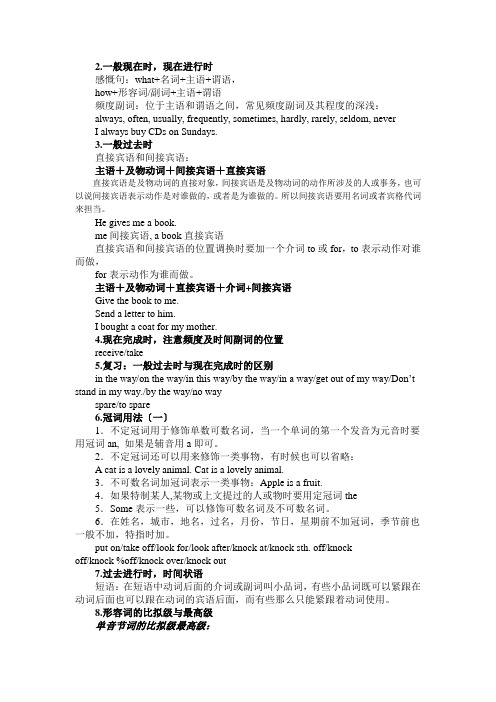
2.一般现在时,现在进行时感慨句:what+名词+主语+谓语,how+形容词/副词+主语+谓语频度副词:位于主语和谓语之间,常见频度副词及其程度的深浅:always, often, usually, frequently, sometimes, hardly, rarely, seldom, neverI always buy CDs on Sundays.3.一般过去时直接宾语和间接宾语:主语+及物动词+间接宾语+直接宾语直接宾语是及物动词的直接对象,间接宾语是及物动词的动作所涉及的人或事务,也可以说间接宾语表示动作是对谁做的,或者是为谁做的。
所以间接宾语要用名词或者宾格代词来担当。
He gives me a book.me间接宾语, a book直接宾语直接宾语和间接宾语的位置调换时要加一个介词to或for,to表示动作对谁而做,for表示动作为谁而做。
主语+及物动词+直接宾语+介词+间接宾语Give the book to me.Send a letter to him.I bought a coat for my mother.4.现在完成时,注意频度及时间副词的位置receive/take5.复习:一般过去时与现在完成时的区别in the way/on the way/in this way/by the way/in a way/get out of my way/Don’t stand in my way./by the way/no wayspare/to spare6.冠词用法〔一〕1.不定冠词用于修饰单数可数名词,当一个单词的第一个发音为元音时要用冠词an, 如果是辅音用a即可。
2.不定冠词还可以用来修饰一类事物,有时候也可以省略:A cat is a lovely animal. Cat is a lovely animal.3.不可数名词加冠词表示一类事物:Apple is a fruit.4.如果特制某人,某物或上文提过的人或物时要用定冠词the5.Some表示一些,可以修饰可数名词及不可数名词。
《新概念英语》第二册第12课

《新概念英语》第二册第12课Lesson 12 Goodbye and good luck 再见,一路顺风1:Our neighbor, Captain Charles Alison, will sail from Portsmouth tomorrow. We shall meet him at the harbour early in the morning.1):一般将来时:一般将来时表示将来某个时间将要发生的动作或存在的状态,亦表示将来经常或重复发生的动作,常与表示将来的时间状语连用,如:tomorrow,next year,soon等。
表示将来时间的语法手段常见的至少有5种,即“shall/will + 动词原形”;“be going to + 不定式”;“be + -ing”;“be to + 不定式”以及一般现在时。
1.1 一般将来时的构成肯定句:主语+ shall/will + 动词原形... 否定句:主语+ shall/will + not + 动词原形...疑问句:Shall/Will + 主语+ 动词原形...? 疑问代词/疑问副词+ shall/will + 主语+ 动词原形...?1.2 一般将来时的肯定句句型:主语+ shall/will + 动词原形....在书面语中,如果主语是第一人称,常用“助动词shall + 动词原形”构成一般将来时的肯定句,即“I/we + shall + 动词原形”;shall可缩写为'll:If I have time tomorrow,I think I'll get a haircut.如果我明天有时间,我想去理个发。
在口语中,所有的人称都可以用will,即“主语(所有人称)+ will + 动词原形...”;will可缩写为'll:Some day,I'll tell you.将来某一天我会告诉你的。
新概念英语第二册-目录-语法总结
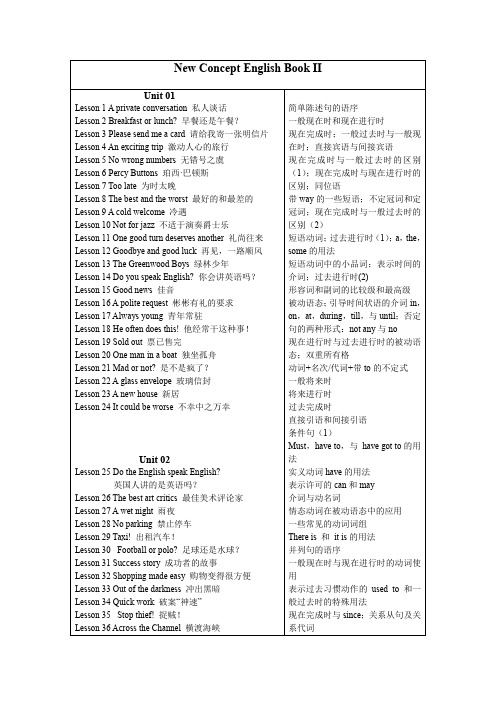
Unit 01
Lesson 1 A private conversation私人谈话
Lesson 2 Breakfast or lunch?早餐还是午餐?
Lesson 3 Please send me a card请给我寄一张明信片
Lesson 4 An exciting trip激动人心的旅行
Lesson91 Three men in a basket三人同篮
Lesson92 Asking for trouble自找麻烦
Lesson93 A noble gift崇高的礼物
Lesson94 Future champions未来的冠军
Lesson95 A fantasy纯属虚构
Lesson96 The dead return亡灵返乡
定冠词the的用法;some与any的区别
过去进行时与一般过去时;use to的用法
比较结构表示法;Little和few的用法
用于表示目的和方向的介词和副词
被动语态用法补充
Will和be going to
一般将来完成时;将来完成进行时
过去完成时与从属连词when,before,after,until
Lesson58 A blessing in disguise?是因祸得福吗?
Lesson59 In or out?进来还是出去?
Lesson60 The future卜算未来
Lesson61 Trouble with the Hubble哈勃望远镜的困境
Lesson62 After the fire大火之后
Lesson21 Mad or not?是不是疯了?
Lesson22 A glass envelope玻璃信封
一般将来时知识点
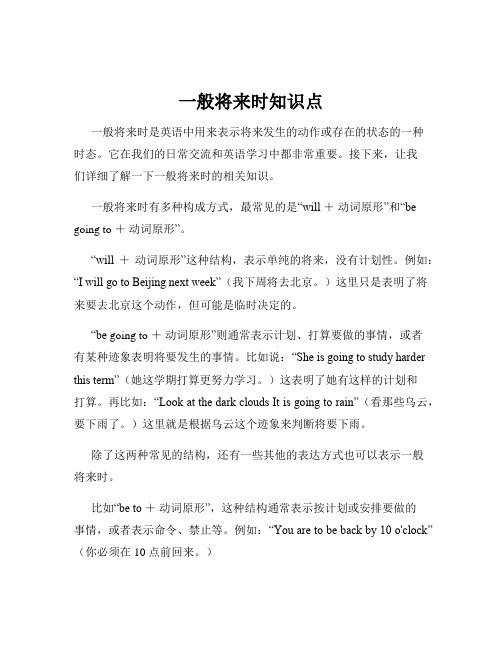
一般将来时知识点一般将来时是英语中用来表示将来发生的动作或存在的状态的一种时态。
它在我们的日常交流和英语学习中都非常重要。
接下来,让我们详细了解一下一般将来时的相关知识。
一般将来时有多种构成方式,最常见的是“will +动词原形”和“be going to +动词原形”。
“will +动词原形”这种结构,表示单纯的将来,没有计划性。
例如:“I will go to Beijing next week”(我下周将去北京。
)这里只是表明了将来要去北京这个动作,但可能是临时决定的。
“be going to +动词原形”则通常表示计划、打算要做的事情,或者有某种迹象表明将要发生的事情。
比如说:“She is going to study harder this term”(她这学期打算更努力学习。
)这表明了她有这样的计划和打算。
再比如:“Look at the dark clouds It is going to rain”(看那些乌云,要下雨了。
)这里就是根据乌云这个迹象来判断将要下雨。
除了这两种常见的结构,还有一些其他的表达方式也可以表示一般将来时。
比如“be to +动词原形”,这种结构通常表示按计划或安排要做的事情,或者表示命令、禁止等。
例如:“You are to be back by 10 o'clock”(你必须在 10 点前回来。
)“be about to +动词原形”表示即将发生的动作,通常不与具体的时间状语连用。
例如:“The film is about to start”(电影即将开始。
)在使用一般将来时的时候,要注意时间状语的搭配。
常见的时间状语有:tomorrow(明天)、next week(下周)、in the future(在未来)、soon(很快)等等。
另外,一般将来时的否定形式和疑问形式也有一定的规律。
“will +动词原形”的否定形式是“will not(won't)+动词原形”,疑问形式是把“will”提到主语前面。
(完整版)新概念2知识点总结

新概念2知识点总结第一部分、时态总结一、一般过去时;一、定义。
1. 表示过去的动作或状态,常和明确的过去时间状语连用,如:yesterday, last week, three days ago, in 1998,just now等,或与由when引导的从句连用。
2. 也可以表示过去某一段时间内经常或反复出现的动作。
句子中常带有every day, often, usually, always, sometimes等时间状语。
例:When I worked in the company, I got up early every morning.在那家公司上班时,我每天早晨都起得很早。
In the past few years she usually went touring during her summer holidays.在过去的几年里,每逢暑假她总是出去旅游。
二、一般过去时态句子结构1.Be 动词的一般过去时态在没有实义动词的句子中使用be动词,am is 的过去式为was; are的过去式为were.如:I was late yesterday.We weren't late yesterday.She wasn't a teacher three years ago.Were you ill yesterday?Were they once your classmates?---Yes, I was. ---No, I wasn't.Who were your best friends in your primary school?2. 实义动词的一般过去时态肯定句要使用动词的过去式,否定句和疑问句要使用助动词do和does 的过去式did.如:I went home at nine o'clock yesterday.I didn't go home yesterday. He didn't tell me about you.Did you go home yesterday?---Yes, I did. ---No, I didn't.When did you finish your homework last night/the day before yesterday? 3. 助动词和情态动词过去式如下:shall―should(将要)用于第一人称单数will―would(将要)用于所有人称can―could(能,会)may―might(可以)must―must (必须)have to―had to(不得不)助动词和情态动词的过去时态要使用他们的过去式,后面的动词还使用原形。
一般将来时的用法及常见句型总结

一般将来时的用法及常见句型总结一般将来时是英语中用来表示将来发生的动作或状态的一种时态。
在句子中,一般将来时通常与表示将来的时间状语词搭配使用,如tomorrow(明天)、next week(下周)、in the future(将来)等。
同时,一般将来时也可以使用助动词will或shall来构成。
下面将介绍一般将来时的用法及常见句型。
1. 一般将来时的肯定句结构:主语 + will/shall + 动词原形 + 其他成分例如:- I will go to the park tomorrow.(我明天将去公园。
)- They will watch a movie tonight.(他们今晚将要看电影。
)2. 一般将来时的否定句结构:主语 + will/shall + not + 动词原形 + 其他成分例如:- She will not join the party.(她不会参加派对。
)- We shall not travel to Europe.(我们不会去欧洲旅行。
)3. 一般将来时的疑问句结构:Will/Shall + 主语 + 动词原形 + 其他成分?- Will you come to the concert?(你会来听音乐会吗?)- Shall we visit the museum tomorrow?(我们明天要参观博物馆吗?)4. 一般将来时的特殊用法:a. 表示计划或安排例如:- We will have a meeting next Monday.(我们下周一要开会。
)- They will go on a vacation in August.(他们八月份将去度假。
)b. 表示意愿或意图例如:- He will help you with your homework.(他愿意帮你做作业。
)- She shall buy a new car soon.(她打算很快买辆新车。
)c. 表示预测或推断例如:- It will rain tomorrow.(明天会下雨。
英语一般将来时笔记整理

英语一般将来时笔记整理一般将来时(Simple Future Tense)是英语中用来表示将来发生的动作、事件或情况的时态。
它可以用于陈述事实、预测未来和表达意图。
一般将来时的构成形式为:will/shall + 动词原形。
例如:1. I will go to the park tomorrow.(我明天会去公园。
)2. She will study abroad next year.(她明年会出国留学。
)3. They will have a meeting in the afternoon.(他们下午会开会。
)一般将来时还可以使用be going to + 动词原形来表达将来的打算、决定或意图。
例如:1. I am going to visit my grandparents this weekend.(我这个周末打算去看望我的祖父母。
)2. He is going to buy a new car next month.(他下个月打算买辆新车。
)3. They are going to have a party to celebrate their anniversary.(他们打算举办一个派对来庆祝他们的周年纪念。
)一般将来时也可以用于表达预测、猜测或推测未来的情况。
例如:1. It will rain tomorrow.(明天会下雨。
)2. They will probably win the game.(他们有可能会赢得比赛。
)3. She won't pass the exam.(她不会通过考试。
)需要注意的是,一般将来时通常不能与表示将来时间的副词或短语连用,因为将来时本身已经表达了将来的含义。
总结起来,一般将来时是用来表示将来发生的动作、事件或情况的时态,可以用于陈述事实、预测未来和表达意图。
它的构成形式为will/shall + 动词原形,也可以使用be going to + 动词原形来表达将来的打算、决定或意图。
新概念英语第二册知识点总结

新概念英语第二册知识点总结一、语法知识点。
1. 时态。
- 一般现在时。
- 用法:表示经常发生的动作或存在的状态,客观事实或真理等。
例如:He often goes to school by bike.(表示经常的动作)The earth moves around the sun.(客观真理)- 动词形式:主语为第三人称单数时,动词要加 -s或 -es,其余情况用原形。
- 一般过去时。
- 用法:表示过去某个时间发生的动作或存在的状态。
例如:I saw him yesterday.- 动词形式:规则动词一般在词尾加 -ed,不规则动词有特殊变化(如go - went,see - saw等)。
- 现在进行时。
- 用法:表示此时此刻正在进行的动作,也可表示现阶段正在进行但此刻不一定在做的动作。
例如:She is reading a book now.(此刻正在读)He is working on a project this month.(现阶段正在做)- 动词形式:be动词(am/is/are)+动词的 -ing形式。
- 过去进行时。
- 用法:表示过去某个时刻或某段时间正在进行的动作。
例如:When I called him, he was having dinner.- 动词形式:be动词(was/were)+动词的 -ing形式。
- 现在完成时。
- 用法:表示过去发生的动作对现在造成的影响或结果,或者表示从过去开始一直持续到现在的动作或状态。
例如:I have lost my key.(过去丢钥匙,现在找不到)He has lived here for ten years.(从过去住到现在,持续了十年)- 动词形式:have/has +过去分词。
- 过去完成时。
- 用法:表示在过去某个时间或动作之前已经发生或完成的动作,即“过去的过去”。
例如:When I got to the station, the train had already left.- 动词形式:had +过去分词。
新概念英语语法总结
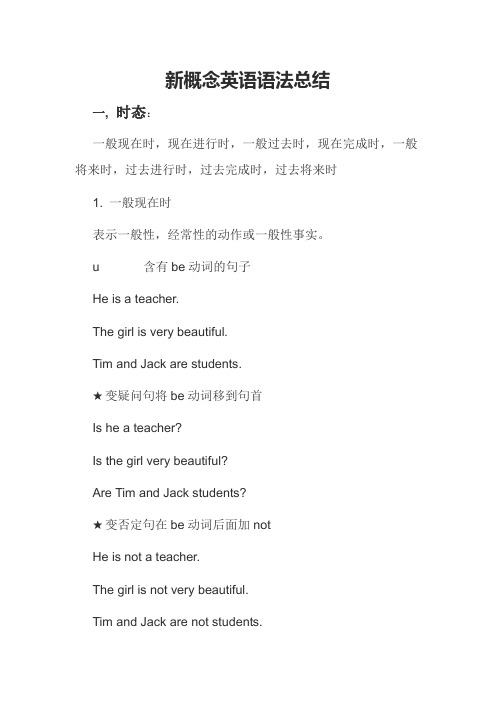
新概念英语语法总结一,时态:一般现在时,现在进行时,一般过去时,现在完成时,一般将来时,过去进行时,过去完成时,过去将来时1. 一般现在时表示一般性,经常性的动作或一般性事实。
u 含有be动词的句子He is a teacher.The girl is very beautiful.Tim and Jack are students.★变疑问句将be动词移到句首Is he a teacher?Is the girl very beautiful?Are Tim and Jack students?★变否定句在be动词后面加notHe is not a teacher.The girl is not very beautiful.Tim and Jack are not students.★肯定回答及否定回答Yes, he is. No, he is not.Yes, she is. No, she is not.Yes, they are. No, they are not.u 不含有动词的句子,即含有一般动词的句子第三人称单数及单数名词He likes books.She likes him.The dog likes bones.★变疑问句在句首加does, 动词变为原型Does he like books?Does she like him?Does the dog like bones?★变否定句在主语及动词之间加doesn’t, 动词变为原型He doesn’t like books.She doesn’t like him.The dog doesn’t like bones.★肯定回答及否定回答:Yes, he does. No, he doesn’t.Yes, she does. No, she doesn’tYes, it does. No, it doesn’t.注意:第三人称单数形式一般在动词后面加S,不要和名词复数混淆,变否定句或疑问句时名词复数没有任何变化。
新概念英语第二册语法总结:一般将来时
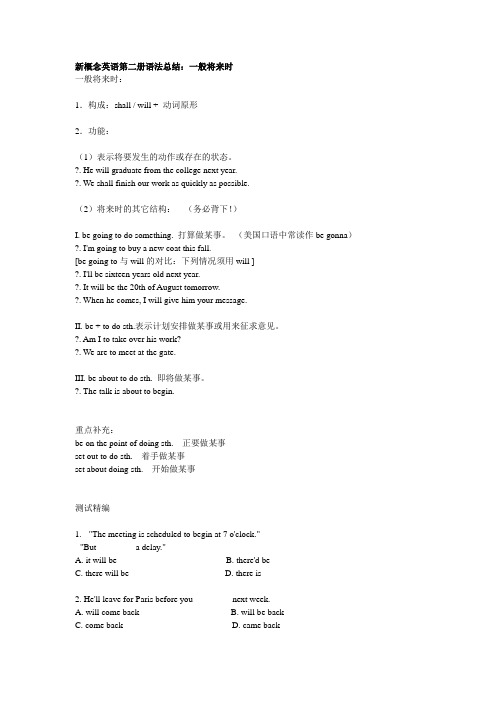
新概念英语第二册语法总结:一般将来时一般将来时:1.构成:shall / will + 动词原形2.功能:(1)表示将要发生的动作或存在的状态。
?. He will graduate from the college next year.?. We shall finish our work as quickly as possible.(2)将来时的其它结构:(务必背下!)I. be going to do something. 打算做某事。
(美国口语中常读作be gonna)?. I'm going to buy a new coat this fall.[be going to与will的对比:下列情况须用will ]?. I'll be sixteen years old next year.?. It will be the 20th of August tomorrow.?. When he comes, I will give him your message.II. be + to do sth.表示计划安排做某事或用来征求意见。
?. Am I to take over his work??. We are to meet at the gate.III. be about to do sth. 即将做某事。
?. The talk is about to begin.重点补充:be on the point of doing sth. 正要做某事set out to do sth. 着手做某事set about doing sth. 开始做某事测试精编1. - "The meeting is scheduled to begin at 7 o'clock."- "But ________ a delay."A. it will beB. there'd beC. there will beD. there is2. He'll leave for Paris before you ________ next week.A. will come backB. will be backC. come backD. came back3. Our next meeting ________ on 1st December.A. has been heldB. will holdC. is to be heldD. is holding4. Where ________ a will, there is a way.A. there will haveB. has been thereC. there isD. there has been5. It ________ be Wednesday tomorrow.A. is going toB. willC. is about toD. is to(后设答案,大家不要偷看哦~(*^__^*) 嘻嘻……)KEYS1. C2. C3. C4. C5. B。
新概念英语第二册第13课重点语法句型
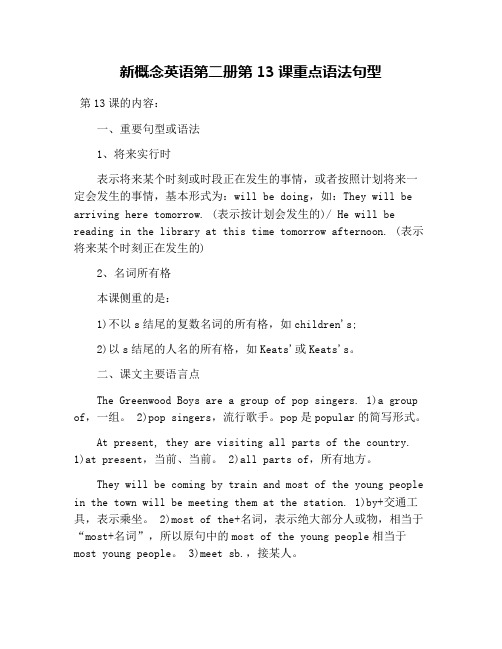
新概念英语第二册第13课重点语法句型第13课的内容:一、重要句型或语法1、将来实行时表示将来某个时刻或时段正在发生的事情,或者按照计划将来一定会发生的事情,基本形式为:will be doing,如:They will be arriving here tomorrow. (表示按计划会发生的)/ He will be reading in the library at this time tomorrow afternoon. (表示将来某个时刻正在发生的)2、名词所有格本课侧重的是:1)不以s结尾的复数名词的所有格,如children's;2)以s结尾的人名的所有格,如Keats'或Keats's。
二、课文主要语言点The Greenwood Boys are a group of pop singers. 1)a group of,一组。
2)pop singers,流行歌手。
pop是popular的简写形式。
At present, they are visiting all parts of the country.1)at present,当前、当前。
2)all parts of,所有地方。
They will be coming by train and most of the young people in the town will be meeting them at the station. 1)by+交通工具,表示乘坐。
2)most of the+名词,表示绝大部分人或物,相当于“most+名词”,所以原句中的most of the young people相当于most young people。
3)meet sb.,接某人。
Tomorrow evening they will be singing at the Workers' Club. 1)时间状语tomorrow evening提到句首,是为了凸显后面乐队要做什么,这是尾重原理的使用。
新概念英语第2册重点学习内容Lesson13~15(最新)

新概念英语第2册重点学习内容Lesson13一、重要句型或语法1、将来进行时表示将来某个时刻或时段正在发生的事情,或者按照计划将来一定会发生的事情,基本形式为:will be doing,如:They will be arriving here tomorrow. (表示按计划会发生的)/ He will be reading in the library at this time tomorrow afternoon. (表示将来某个时刻正在发生的)2、名词所有格本课侧重的是:1)不以s结尾的复数名词的所有格,如children's;2)以s结尾的人名的所有格,如Keats'或Keats's。
二、课文主要语言点The Greenwood Boys are a group of pop singers. 1)a group of,一组。
2)pop singers,流行歌手。
pop是popular的简写形式。
At present, they are visiting all parts of the country. 1)at present,当前、目前。
2)all parts of,所有地方。
They will be coming by train and most of the young people in the town will be meeting them at the station. 1)by+交通工具,表示乘坐。
2)most of the+名词,表示大部分人或物,相当于“most+名词”,所以原句中的most of the young people相当于most young people。
3)meet sb.,接某人。
Tomorrow evening they will be singing at the Workers' Club. 1)时间状语tomorrow evening提到句首,是为了凸显后面乐队要做什么,这是尾重原理的运用。
新概念英语第二册Lesson 12 语法
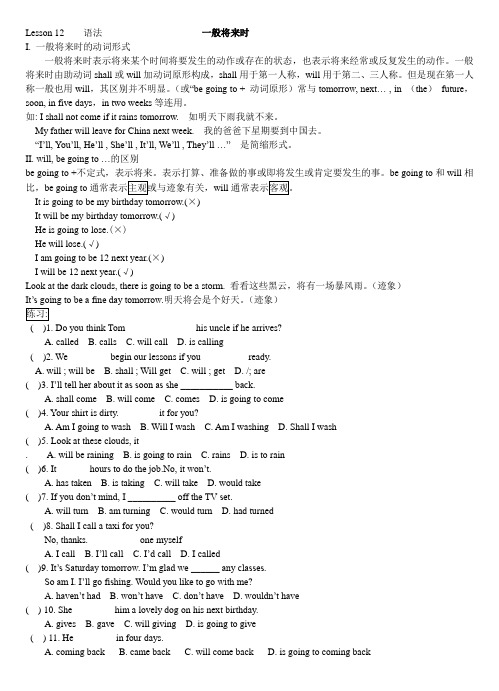
Lesson 12 语法一般将来时I. 一般将来时的动词形式一般将来时表示将来某个时间将要发生的动作或存在的状态,也表示将来经常或反复发生的动作。
一般将来时由助动词shall或will加动词原形构成,shall用于第一人称,will用于第二、三人称。
但是现在第一人称一般也用will,其区别并不明显。
(或“be going to + 动词原形)常与tomorrow, next… , in (the)future,soon, in five days,in two weeks等连用。
如: I shall not come if it rains tomorrow.如明天下雨我就不来。
My father will leave for China next week.我的爸爸下星期要到中国去。
“I’ll, Y ou’ll, He’ll , She’ll , It’ll, We’ll , They’ll …”是简缩形式。
II. will, be going to …的区别be going to +不定式,表示将来。
表示打算、准备做的事或即将发生或肯定要发生的事。
be going to和will相比,be going to通常表示主观或与迹象有关,will通常表示客观。
It is going to be my birthday tomorrow.(×)It will be my birthday tomorrow.(√)He is going to lose.(×)He will lose.(√)I am going to be 12 next year.(×)I will be 12 next year.(√)Look at the dark clouds, there is going to be a storm. 看看这些黑云,将有一场暴风雨。
(迹象)It’s going to be a fine day tomorrow.明天将会是个好天。
新概念英语第二册:英语时态汇总

【导语】新概念英语⽂章短⼩精悍,语句幽默诙谐,语法全⾯系统。
适合各个阶层的⼈群学习参考。
相信有了新概念英语,你也可以成为“⼤神”级别的⼈物!还在等什么?快来加⼊学习吧!⼩编与您⼀起学习进步! 1.现在进⾏时: 1)表⽰正在进⾏的动作 2 )表⽰现阶段正在做的事 3)表⽰将要做的事 结构:主 + am/is/are + doing 2.⼀般过去时: 过去某⼀时间点进⾏的动作 结构:主 + did 3.⼀般将来时: 表⽰对将来的打算 结构:主 + will/shall + do 4.现在完成时: ⽰发⽣在过去对现在产⽣影响的动作 结构:主 + have/has done 5.过去进⾏时: 表⽰过去某⼀时间正在进⾏的动作 结构: 主 + was/were + doing 6.将来进⾏时: 表⽰将来某⼀时间正在进⾏的动作 结构: 主+ will/shall + be doing 7.过去完成时: 表⽰动作在过去某⼀时间点之前已经完成 (过去的过去,通常与⼀般过去时互为主从句) 结构:主 + had done 8.将来完成时:表⽰到未来某⼀时间将已经完成的动作 结构:主 + will/shall + have done 9.现在完成进⾏时: 表⽰动作从过去开始,持续到现在,对现在造成影响 结构:主 + have/has + been doing 10.将来完成进⾏时:表⽰状况将⼀直持续到说话⼈所提及的时间 结构:主 + will have + been doing 11.过去完成进⾏时:表⽰动作在过去更早的某⼀时间段内持续进⾏,并对过去产⽣影响。
结构:主 + had + been doing。
新概念英语第二册:英语时态汇总

【导语】新概念英语⽂章短⼩精悍,语句幽默诙谐,语法全⾯系统。
适合各个阶层的⼈群学习参考。
相信有了新概念英语,你也可以成为“⼤神”级别的⼈物!还在等什么?快来加⼊学习吧!⼩编与您⼀起学习进步! 1.现在进⾏时: 1)表⽰正在进⾏的动作 2 )表⽰现阶段正在做的事 3)表⽰将要做的事 结构:主 + am/is/are + doing 2.⼀般过去时: 过去某⼀时间点进⾏的动作 结构:主 + did 3.⼀般将来时: 表⽰对将来的打算 结构:主 + will/shall + do 4.现在完成时: ⽰发⽣在过去对现在产⽣影响的动作 结构:主 + have/has done 5.过去进⾏时: 表⽰过去某⼀时间正在进⾏的动作 结构: 主 + was/were + doing 6.将来进⾏时: 表⽰将来某⼀时间正在进⾏的动作 结构: 主+ will/shall + be doing 7.过去完成时: 表⽰动作在过去某⼀时间点之前已经完成 (过去的过去,通常与⼀般过去时互为主从句) 结构:主 + had done 8.将来完成时:表⽰到未来某⼀时间将已经完成的动作 结构:主 + will/shall + have done 9.现在完成进⾏时: 表⽰动作从过去开始,持续到现在,对现在造成影响 结构:主 + have/has + been doing 10.将来完成进⾏时:表⽰状况将⼀直持续到说话⼈所提及的时间 结构:主 + will have + been doing 11.过去完成进⾏时:表⽰动作在过去更早的某⼀时间段内持续进⾏,并对过去产⽣影响。
结构:主 + had + been doing。
新概念2B语法总结练习(十三)

新概念2A语法总结练习(十三):一般将来时一.定义:一般将来时:表示将来某一时刻的动作或状态,或将来某一段时间内经常的动作或状态。
一般将来时由助动词shall(第一人称),will(第二、三人称)动词原形构成。
美国英语则不管什么人称,一律用will。
二.构成及用法:will+动词原形构成。
will+v.原形1)will常简略为’ll,并与主语连写在一起,如:I’ll , he’ll,it’ll, we’ll, you’ll, they’ll。
2)一般疑问句如用will you ……?其简略答语必须是Yes, I will 或No,I won’t;三.will与be going to 的分别:1)be going to表示近期、眼下就要发生的事情,will表示的将来时间则较远一些,如:He is going to write a letter tonight.He will write a book one day.2)be going to 表示根据主观判断将来肯定发生的事情,will表示客观上将来势必发生的事情。
He is seriously ill. He is going to die.He will be twenty years old.3) be going to 含有“计划,准备”的意思,而will则没有这个意思。
如:She is going to lend us her book.He will be here in half an hour.四.单选:1.Charlie here next month.A. isn’t workingB. doesn’t workingC. isn’t going to workingD. won’t work2. He very busy this week, he free next week.A. will be; isB. is; isC. will be ; will beD. is; will be3. There a dolphin show in the zoo tomorrow evening.A. wasB. is going to haveC. will haveD. is going to be4. - you free tomorrow?-No. I free the day after tomorrow.A. Are; going to ; willB. Are; going to be; willC. Are; going to ; will beD. Are; going to be; will be5. Mother me a nice present on my next birthday.A. will givesB. will giveC. givesD. give6. -Where is the morning paper?- I if for you at once.A.getB. am gettingC. to getD. will get7. If they come, we a meeting.A. haveB. will haveC. hadD. would have8. He her a beautiful hat on her next birthday.A. givesB. gaveC. will givingD. is going to giving9. He in three days.A. coming backB. came backC. will come backD. is going to coming back10. – Will his parents go to see the London tomorrow?– No, (不去).A.they willn’tB. they won’tC. they aren’tD. they don’t11. We the work this way next time.A. doB. will doC. going to doD. will doing12. Tomorrow he a kite in the open air first, and then boating in the park.A. will fiy; will goB. will fly; goseC. is going to fly; will goesD. flies ; will go。
- 1、下载文档前请自行甄别文档内容的完整性,平台不提供额外的编辑、内容补充、找答案等附加服务。
- 2、"仅部分预览"的文档,不可在线预览部分如存在完整性等问题,可反馈申请退款(可完整预览的文档不适用该条件!)。
- 3、如文档侵犯您的权益,请联系客服反馈,我们会尽快为您处理(人工客服工作时间:9:00-18:30)。
新概念英语第二册语法总结:一般将来时
一般将来时:
1.构成:shall / will + 动词原形
2.功能:
(1)表示将要发生的动作或存在的状态。
►. He will graduate from the college next year.
►. We shall finish our work as quickly as possible.
(2)将来时的其它结构:(务必背下!)
I. be going to do something. 打算做某事。
(美国口语中常读作be gonna)►. I'm going to buy a new coat this fall.
[be going to与will的对比:下列情况须用will ]
►. I'll be sixteen years old next year.
►. It will be the 20th of August tomorrow.
►. When he comes, I will give him your message.
II. be + to do sth.表示计划安排做某事或用来征求意见。
►. Am I to take over his work?
►. We are to meet at the gate.
III. be about to do sth. 即将做某事。
►. The talk is about to begin.
重点补充:
be on the point of doing sth. 正要做某事
set out to do sth. 着手做某事
set about doing sth. 开始做某事
测试精编
1. - "The meeting is scheduled to begin at 7 o'clock." - "But ________ a delay."
A. it will be
B. there'd be
C. there will be
D. there is
2. He'll leave for Paris before you ________ next week.
A. will come back
B. will be back
C. come back
D. came back
3. Our next meeting ________ on 1st December.
A. has been held
B. will hold
C. is to be held
D. is holding
4. Where ________ a will, there is a way.
A. there will have
B. has been there
C. there is
D. there has been
5. It ________ be Wednesday tomorrow.
A. is going to
B. will
C. is about to
D. is to (后设答案,大家不要偷看哦~(*^__^*) 嘻嘻……)KEYS
1. C
2. C
3. C
4. C
5. B。
